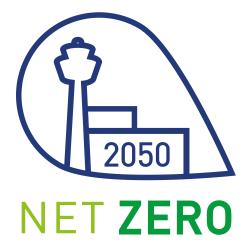Led by ACI EUROPE, the trade association for the European airport industry, Net Zero 2050 commitment was initially undertaken as part of the collective movement of European airports to reach Net Zero. The pledge, which was first launched in June 2019 and undersigned by 194 airports (operated by 40 airport operators across 24 European countries) marked a significant step change in the climate action ambitions for the European airport industry.
RIX Riga Airport joined the initiative in 2021, thereby acknowledging its dedication to achieve complete reduction of CO2 emissions in the emission sources under direct control of the Airport until 2050.
In 2022 Riga Airport has approved a medium-term Sustainability strategy until 2030 to facilitate achievement of global climate goals and consider business transformation and in 2023 Airport’s first Net Zero roadmap was elaborated with the target year 2050. In 2024 Riga Airport elaborated an updated Net Zero roadpmap to reach zero emission level until 2035.
The Net Zero 2035 roadmap will support the efforts of Riga Airport to move forward with concrete measures to reduce emissions and to reach higher level certificate within Airport Carbon Accreditation (ACA) program which is the only CO2 reduction program created specifically for airports.
In 2024 Riga Airport plans to certify for Level 3 of ACA programme that aims to reduce the emissions not under direct control of the Airport but are caused by the companies and organisations working at the Airport, and in 2035 to certify for topmost Level of ACA programme which shows that the airport is maintaining a Net Zero balance on scopes 1 and 2 and actively addressing Scope 3 emissions.
In order to move towards Level 3 of the ACA program, Riga Airport has been measuring Scope 3 emissions since 2022 and has developed a stakeholder engagement plan. This plan includes mutual communication and cooperation activities that will promote a unified approach of Riga Airport's stakeholders in achieving the goal of mitigating climate change and will promote the transfer of knowledge in the Latvian aviation industry with examples of good practice.

